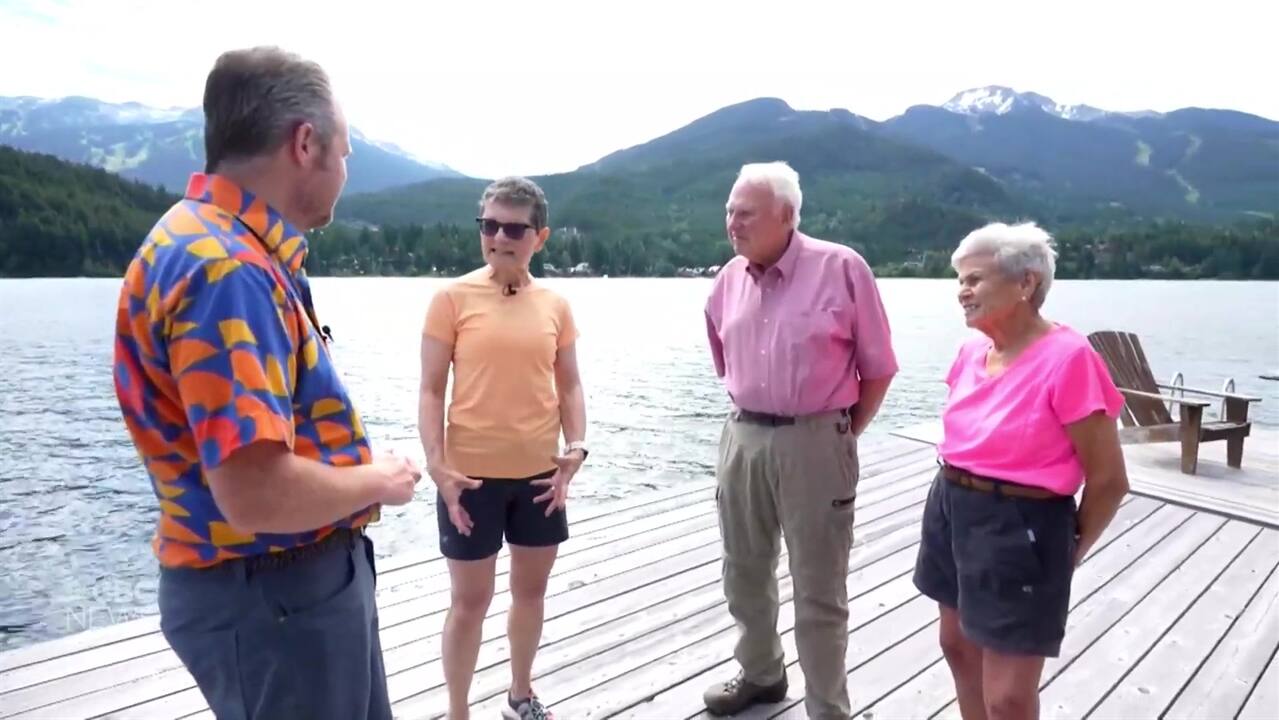Volunteers step up to fill in gaps in government monitoring of B.C. lakes

Lynn Kriwoken dips a black rod into the deep waters of Alta Lake next to Whistler, B.C., about 157 kilometres north of Vancouver, and a bunch of different numbers start rapidly moving on her monitor.
Depth, oxygen levels, turbidity and much more appear on the screen — metrics that measure the relative health of the water in the moment, and when done regularly enough, reflects the health of the lake over time.
“This is very clear water here … we didn’t see anything that would make us say, ‘oh my goodness, this is a big problem,'” she said with a smile and some relief.
“Water quality has always been in the background, but it’s certainly becoming increasingly a big issue, especially with climate change.”
There are 386,016 natural lakes in British Columbia, according to the provincial government, which actively monitors 53 of them — while volunteers help monitor about 36 more.
Lakes across the province face the same strains as other bodies of water when it comes to rising temperatures. Droughts can lead to erosion and loss of habitat, while warmer water can lead to threatening algae bloom.
For decades, Kriwoken worked for the provincial government, retiring as the executive director of water protection and sustainability.
Now, she’s president of the Whistler Lakes Conservation Association, one of thousands of volunteers helping to fill in the gaps in the province’s lake monitoring program, and hoping to raise awareness of just how much needs to be done to ensure lakes are being taken care of.
“We know government budgets are prioritized and re-allocated and moved, and there just isn’t the funding or the resources to do it all,” she said.
“It’s not easy to nurture a stewardship ethic in a resort municipality … like Whistler. It takes time, it takes resources, it takes people, it takes partners.”
More monitoring needed
Norm Zirnhelt, executive director of the B.C. Lake Stewardship Society, says 36 or so lakes are currently being monitored by volunteers across the province, although the level of commitment can vary from lake to lake.
“We see if there’s indications of change and if there are, then you start looking deeper into what might be causing those changes, and then hopefully that would result in some kind of mitigation or management action that would head off a significant deterioration of the lake,” said Zirnhelt with the B.C. Lake Stewardship Society.
“There’s a bigger need now than ever for monitoring so that we can understand things like which lakes react more strongly or in adverse ways to climate change.”
CBC News has been on the search for B.C.’s best lake, a place for many to enjoy a nice summer swim and where thousands around the province volunteer to monitor the water.
At the same time, Zirnhelt says there are plenty of other factors that can contribute to lake degradation, from population growth to industry activity.
“Maybe any one land use, such as agriculture runoff through manure for example, maybe that in itself is not the only cause of the deterioration of water quality,” he said.
“But maybe when you add that to a number of other things, like failing septic systems and shore-zone vegetation destruction, they can add up to causing some big problems and they’re very difficult to monitor.”
Strategizing water security
With so many lakes, there’s a general acknowledgement that the government can’t track them all, and that the volunteer program is an important first line of defence.
But some argue there’s more that can be done.
“I like the participatory aspect of the monitoring programs, but the enforcement side of things needs strengthening — and that’s on government,” said Green Party Leader Sonia Furstenau.

Some of that is coming, albeit slowly. In March, the province announced $100 million for the Watershed Security Fund, and this winter will be announcing the creation of a security strategy co-developed with First Nations around the province.
The province is also developing a new tool called “administrative monetary penalties” for organizations that contravene the Water Sustainability Act.
In theory, it would provide an easier tool for the government to go after moderate violations of the act, since court actions are time-consuming while tickets can be insufficient.
In the meantime, Kriwoken can only keep heading to the lake, remaining cautiously optimistic about her past work and present volunteering.
“I’m always half glass full,” she said.
“You’ve got to keep putting your best foot forward and try to make a difference, because if we all do that, then the world is a better place.”





